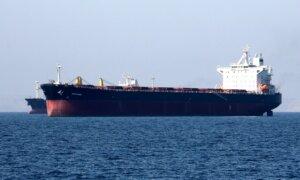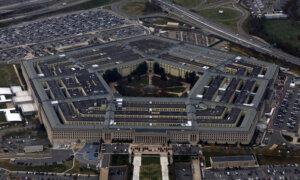Denying Iran the ability to acquire a nuclear weapon and driving the country’s oil exports to zero are stated goals of the memorandum.
President Donald Trump signed a presidential memorandum on Feb. 4 ratcheting up sanctions on the Islamic Republic of Iran.
Tougher measures are meant to impose “maximum pressure” on the nation, according to Trump, and prevent Iran from acquiring a nuclear weapon. He has consistently opposed the idea of allowing the country to develop nuclear capabilities for military purposes.
“They cannot have a nuclear weapon,” Trump said while signing the memorandum in the Oval Office. “They have some of their leadership, I can tell you right now … many of the people at the top ranks of Iran that do not want to have a nuclear weapon.”
Denying Iran the ability to manufacture intercontinental ballistic missiles and other high-tech weaponry are prime objectives of the memo, which calls for the destruction of “Iran’s terrorist network.”
Treasury Secretary Scott Bessent is instructed to use economic pressure by imposing additional sanctions or adopting further enforcement mechanisms on existing sanctions.
One stated goal of the memorandum is to “implement a campaign aimed at driving Iran’s oil exports to zero.”
Department of Justice officials are directed to investigate state-sponsored terrorism, with the attorney general leading efforts to root out networks operating in the United States that are sponsored by Iran or a proxy. Prosecutions are ordered for instances where American citizens are or were harmed by Iranian-funded groups.
The president said a tough approach is needed to address the severity of the issue. He remained hopeful that subsequent negotiations would prove successful.
“I’d love to have a good relationship with everybody,” Trump said. “So, I’m signing this, and I’m unhappy to do it, but I really have not so much choice, because we have to be strong and firm.”
The move comes as the president was meeting with Israeli Prime Minister Benjamin Netanyahu at the White House to discuss Middle East policy and ongoing wars.
“We see eye to eye on Iran,” Netanyahu said during a joint press conference. “We’re both committed to rolling back Iran’s aggression in the region and ensuring that Iran never develops a nuclear weapon.”
The first foreign head of state to visit the White House since Trump was inaugurated said together, they are focused on common objectives.
“If this goal can be achieved with a maximum pressure campaign, so be it, but the important thing is to focus on the goal,” Netanyahu said.
Trump suggested finding a path forward that excludes physical conflict would be mutually beneficial.
“If we could solve this problem without warfare, without all of the things you’ve been witnessing over the last number of years, I think it would be a tremendous thing,” he said.
The president said he believes a desire to end decades-long conflict is widespread.
“I think Iran would like to see peace, too,” Trump said. “Don’t you think they’ve had enough?”
Sanctions have existed on Iran since the U.S. Embassy in Tehran was overtaken in 1979.
Since then, a host of economic conditions targeting the country’s banking, energy, precious metals, and military industries, among others, have restricted the Middle Eastern nation’s ability to trade goods.
Trump has repeatedly said he uses sanctions to punish Iran for supporting terrorist groups such as Hamas and Hezbollah and to hurt the country financially, thus preventing the nation from funding proxy organizations.
“Resources and support disappeared for them…they were essentially broke,” Trump said.
The president initiated his aggressive sanctioning process after withdrawing from the Joint Comprehensive Plan of Action in 2018.
He said at the time that dissolving the agreement was done to protect national security.
Using restrictive trade policies to force Iran into economic isolation is a tactic wielded by the Trump administration to force compliance.
During his first term, he also threatened other nations not to purchase oil from Iran, using U.S. trade strength to enforce his will. Iran’s oil exports subsequently dropped from about 2.5 million barrels per day to less than 500,000, analysts estimated.
Similar actions are now underway, according to the president.
“We will once again enforce the most aggressive possible sanctions,” Trump said.
Calling the Iranian people “beautiful” and “industrious,” he welcomed negotiations with the nation’s leaders.
“I want Iran to be peaceful and successful,” Trump said. “I would love to be able to make a great deal.”
The president looked to the future with cautious optimism and reiterated his call for an end to hostilities across the globe.
“We’ll see whether or not we can arrange or work out a deal with Iran, and everybody can live together,” Trump said. “And maybe that’s possible, and maybe it’s not possible. It would be great if we could have a Middle East and the world at total peace, but right now you don’t have that.”
Original News Source Link – Epoch Times
Running For Office? Conservative Campaign Consulting – Election Day Strategies!


